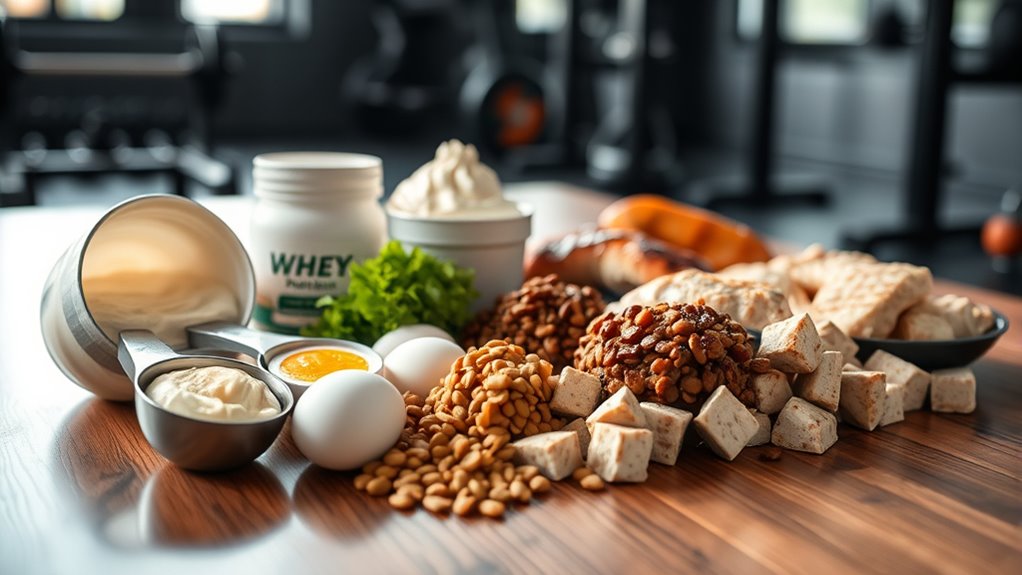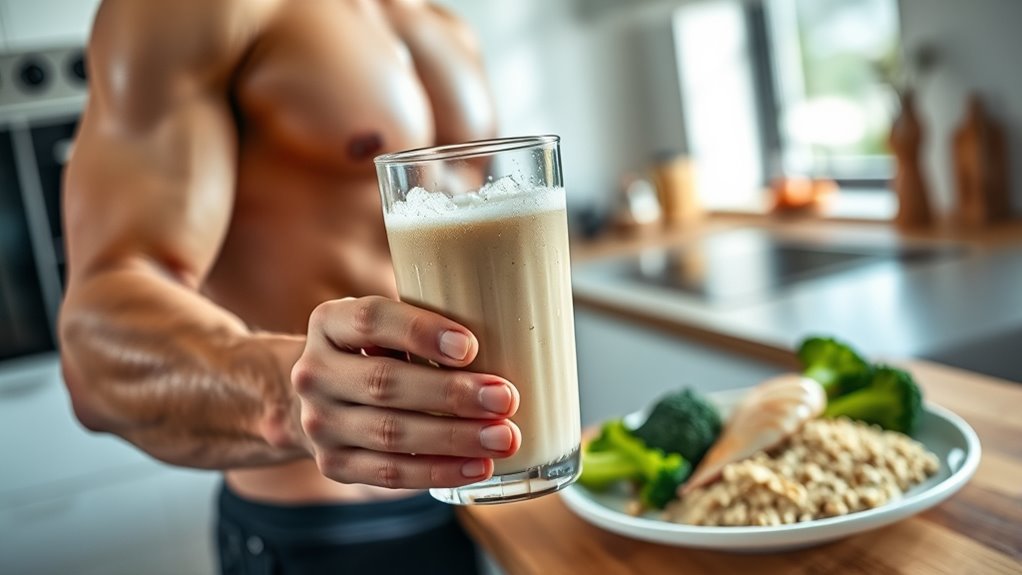For muscle growth, focus on your total daily protein intake rather than perfect timing. Spreading protein evenly across meals keeps muscles supplied with amino acids for repair and growth. While consuming protein soon after workouts can help, it’s not essential, and muscle repair occurs over hours. Maintaining consistent protein intake and meeting daily goals matter most. To learn more about optimizing your approach, keep exploring the key strategies that support your muscle-building journey.
Key Takeaways
- Total daily protein intake is more important than specific timing for muscle growth.
- Spreading protein evenly throughout the day supports consistent muscle repair.
- Consuming high-quality protein post-workout can aid recovery, but immediate intake is not mandatory.
- Muscle repair occurs over hours, making overall nutrition and regular meals crucial.
- Prioritize meeting your daily protein goals rather than focusing solely on immediate post-exercise consumption.
The Role of Protein in Muscle Repair and Growth

Protein plays a crucial role in repairing and building muscle tissue after exercise. When you work out, tiny tears form in your muscles, leading to soreness. Consuming protein helps repair these tears by providing essential amino acids that support muscle recovery. It also aids in reducing muscle soreness by promoting faster healing. Additionally, protein enhances nutrient absorption, guaranteeing your body efficiently takes in essential nutrients needed for muscle growth. Proper protein intake after exercise ensures your muscles have the building blocks necessary for hypertrophy. Without enough protein, your recovery slows, and gains become limited. Focus on high-quality sources to optimize nutrient absorption and support your muscles’ repair process, helping you recover faster and grow stronger with each workout. Moreover, high refresh rates in your training regimen can improve muscle endurance and performance over time.
How Timing Affects Protein Synthesis

Timing plays a critical role in maximizing muscle protein synthesis after your workouts. When you eat protein at regular intervals, such as through meal frequency, you keep your muscles in a state of readiness to rebuild. Consuming protein soon after exercise boosts synthesis by providing amino acids when your muscles are most receptive. Digestion speed also matters—fast-digesting proteins quickly deliver amino acids to stimulate muscle repair, while slower-digesting options extend the availability of nutrients. If you space out your meals too long, you risk missing the ideal window for protein synthesis. Conversely, frequent, well-timed intake ensures a steady supply of amino acids, supporting continuous muscle growth and recovery. Proper timing enhances your efforts and helps you maximize the benefits of your training. Recognizing the importance of fathers’ influence can motivate you to stay consistent with your nutrition.
Optimal Times for Protein Intake Around Workouts

To maximize muscle growth, you should aim to consume protein within a window that aligns with your workout. Eating shortly before or after exercise enhances muscle repair and growth. Focus on high-quality protein sources, which offer complete amino acid profiles. Meal frequency also plays a role—spreading your intake evenly helps maintain a steady supply of amino acids. Here’s a quick guide:
| Timing | Key Point |
|---|---|
| Pre-workout | Fuel muscles, improve performance |
| Post-workout | Replenish glycogen, jumpstart recovery |
| Throughout the day | Maintain consistent amino acid levels |
Staying consistent with meal timing and prioritizing protein quality ensures maximum results. Additionally, regular appliance maintenance plans can help keep your kitchen appliances functioning efficiently, supporting your overall health and wellness routine.
Types of Proteins and Their Absorption Rates

Understanding the different types of proteins and how quickly they are absorbed can help you optimize muscle recovery and growth. Protein hydrolysates are pre-digested, making them absorb faster and ideal post-workout for quick amino acid delivery. On the other hand, plant-based proteins, like pea or rice protein, often digest more slowly, providing a steady release of amino acids over time. Fast-absorbing proteins can spike your amino acid levels quickly, supporting immediate muscle repair, while slower-digesting options sustain amino acid availability longer. Additionally, vetted product reviews can help you choose high-quality protein supplements suited to your needs. Knowing this, you can tailor your protein intake based on your goals—using hydrolysates after workouts and plant-based proteins at other times to maintain muscle synthesis and recovery throughout the day.
Practical Strategies for Incorporating Protein Timing

To maximize muscle growth, focus on consuming protein soon after your workouts to jumpstart recovery. Spread your protein intake evenly throughout the day to support muscle repair and growth consistently. Incorporating these strategies helps guarantee your body gets the nutrients it needs when it’s most receptive.
Post-Workout Protein Intake
Timing your protein intake after a workout can substantially enhance muscle repair and growth. Consuming protein soon after exercise helps reduce muscle soreness and jumpstarts recovery. Aim for 20-30 grams of high-quality protein within 30 to 60 minutes post-workout to maximize benefits. Don’t forget hydration strategies—staying well-hydrated supports nutrient delivery and reduces soreness. Drinking water or electrolyte-rich beverages helps flush out toxins and replenishes fluids lost through sweat. Combining protein with carbs can further improve recovery but focus on your protein timing first. Keep your post-exercise nutrition simple and consistent to ensure your muscles get the nutrients they need when they’re most receptive. Proper timing of prophetic dreams can also enhance your understanding of your subconscious signals and improve your ability to interpret them effectively. This approach accelerates muscle repair, minimizes soreness, and sets the stage for ongoing growth.
Consistent Protein Distribution
Consistently spreading your protein intake throughout the day guarantees your muscles receive a steady supply of amino acids, optimizing growth and recovery. Focusing on meal frequency helps make sure you’re not missing out on essential nutrients and keeps your muscles fueled. Aim for regular, balanced meals with high-quality protein sources to maximize protein quality, which directly impacts muscle repair. Incorporate a variety of protein-rich foods like lean meats, dairy, eggs, and plant-based options to improve amino acid profiles. Distributing your intake evenly prevents long gaps that could hinder muscle synthesis. By planning your meals around your training schedule, you make it easier to maintain consistent protein distribution, ultimately supporting better muscle growth and recovery over time. Understanding angel numbers can also motivate you to stay consistent and positive in your fitness journey.
Common Myths and Misconceptions About Protein Timing

Many believe that timing doesn’t matter or that you need to consume protein immediately after workouts, but these ideas aren’t entirely true. What really counts is your total daily protein intake, not just when you eat it. Understanding these myths can help you make smarter choices for muscle growth. Additionally, paying attention to proper protein handling techniques can optimize how your body uses the nutrients you consume.
Timing Doesn’t Matter
Despite widespread beliefs, the idea that consuming protein immediately after a workout is essential for muscle growth is a myth. Your body doesn’t require perfect nutrient timing to build muscle. Instead, focusing on overall daily protein intake matters more than precise meal timing. Research shows that as long as you consume enough protein throughout the day, your muscles will grow just fine. Here’s a quick comparison:
| Aspect | Common Myth | Reality |
|---|---|---|
| Meal timing | Needs to be immediate post-workout | Flexibility is okay |
| Nutrient timing | Critical for muscle gains | Less important than total intake |
Additionally, understanding the role of hackathons can foster innovative approaches to sports nutrition research and fitness technology.
Immediate Post-Workout Not Essential
While it’s common to hear that you must consume protein immediately after a workout to maximize muscle growth, this isn’t backed by science. The idea of strict nutrient timing has been overstated, and your body doesn’t need protein instantly to benefit. Instead, focus on your overall meal timing throughout the day, ensuring you get enough protein regularly. Muscle repair and growth happen over hours, not minutes, so the timing of your post-workout meal isn’t as critical as previously thought. You don’t have to rush to consume protein right after training. As long as you meet your daily protein needs and spread intake evenly, you’ll support muscle growth effectively. The emphasis should be on consistent, adequate nutrition rather than immediate post-workout consumption.
Total Daily Intake Matters
Focusing solely on meal timing can be misleading; what truly matters is your total daily protein intake. Your muscles need consistent protein to grow, so managing your overall intake is key. Meal frequency and snacking strategies play a role in spreading protein throughout the day, ensuring your muscles get a steady supply. Instead of obsessing over specific timing, aim for balanced meals with enough protein to meet your daily goals. Properly distributed intake supports muscle repair and growth, regardless of whether you prefer multiple small meals or fewer larger ones. Remember, the total amount of protein you consume daily has a bigger impact on muscle development than the exact timing of each meal. Additionally, meal delivery services are increasingly offering customizable options that can help you meet your protein goals conveniently. Focus on hitting your daily target for best results.
Frequently Asked Questions
Does Total Daily Protein Intake Matter More Than Timing?
Total daily protein intake matters more than timing because your body needs enough protein overall to support muscle growth. While meal frequency and timing can help optimize protein absorption, they won’t compensate for inadequate daily intake. Focus on spreading your protein evenly across meals to maximize absorption and muscle repair. Prioritize hitting your daily target first, then fine-tune your meal timing for additional gains.
Can Protein Timing Vary Based on Different Athletic Goals?
Yes, your protein timing should vary based on your athletic goals. If you’re focused on strength, you might prioritize protein intake around training schedules to optimize muscle repair. For endurance goals, spreading protein evenly throughout recovery periods helps maintain energy and support recovery. Adjusting timing guarantees your body gets the nutrients it needs during critical recovery periods, making your training more effective and aligned with your specific goals.
How Does Age Affect Optimal Protein Timing Strategies?
As you age, essential protein timing shifts because age-related absorption decreases, making it vital to consume protein evenly throughout the day. For elderly muscle maintenance, spreading out protein intake helps maximize muscle repair and growth, reducing the risk of sarcopenia. Focus on regular, balanced protein servings to support your muscles effectively, especially after workouts, ensuring your body gets the nutrients it needs for healing and strength as you age.
Is There a Difference in Timing Needs for Vegetarians Versus Omnivores?
You don’t need drastically different timing strategies for vegetarians versus omnivores. Since plant-based proteins often have incomplete amino acid profiles, it’s helpful to consume them throughout the day to guarantee you get all essential amino acids. Timing around workouts can boost muscle repair, but focus on spreading your plant proteins, like beans or tofu, evenly. This approach optimizes amino acid intake, supporting muscle growth regardless of your diet type.
What Role Do Supplements Play in Protein Timing Effectiveness?
Supplements can greatly boost protein timing effectiveness by enhancing supplement absorption and helping you reach ideal dosage. When you take supplements at the right time, they support muscle repair and growth more efficiently. To maximize benefits, focus on proper dosage, avoid excessive intake, and choose high-quality products. This guarantees your body absorbs nutrients better, making your muscle-building efforts more effective and consistent.
Conclusion
So, you’ve got the secret sauce to muscle growth—timing your protein like a pro. Forget magic pills or secret formulas; just eat your protein at the right moments, and watch your gains soar. Who knew that being punctual with your protein intake could be the difference between “meh” muscles and “wow” biceps? Now go ahead, set an alarm, and become the punctual protein master you were born to be. Your muscles will thank you—probably.








